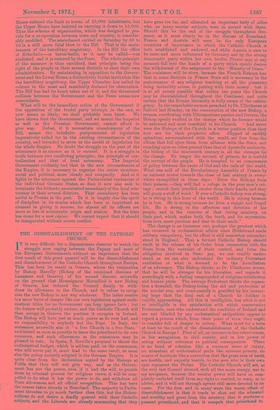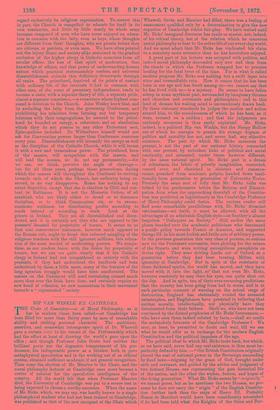THE DISESTABLISHMENT OF THE CATHOLIC CHURCH.
I T is very difficult for a dispassionate observer to watch the struggle now raging between the Papacy and most of the European Governments without an impression that the first result of this great quarrel will be the disestablishment and disendowment of the Catholic Church throughout Europe. This has been its result in Geneva, where the resignation by Bishop Mareilly (Bishop of the conjoined dioceses of Lausanne and Geneva), of his second diocese, avowedly on the ground that Monseigneur Mermillod is new Bishop of Geneva, has induced the Council finally to with- draw its allowance to the Church, and to refuse to recog- nise the new Bishop in any way whatever. The latter resolve is a mere burst of temper like our own legislation against eccle- siastical titles, for no Government can long ignore facts ; but the former will probably endure, and the Catholic Church will then occupy in Geneva the position it occupies in Ireland. The Bishop will have just as much power as he ever had, and no responsibility to anybody but the Pope. In Italy, the statesmen avowedly aim at "a free Church in a free State," and intend as soon as possible to leave the priesthood to its own resources, and such allowances as the communes may be pleased to vote. In Spain, S. Zorrilla's proposal to throw the ecclesiastical budget, which is seldom paid, on the communes, who will never pay it, must lead to the same result, as must also the policy recently adopted in the German Empire. It is quite clear from the declaration signed by the Bishops at Fulda that they will not give way, and as the Govern- ment has not the power, even if it had the will, to punish them by criminal process for religious views, it will be com- pelled to do what it has the power to do, and withdraw all State allowances and all official recognition. This has been the course taken already in Ermeland. The majority in Parlia- ment threaten to go much further than this, but the Hohen- zollerns do not desire a deadly quarrel with their Catholic subjects, and the Liberals are already murmuring that they have gone too far, and alienated an important body of allies who, on many secular subjects, were in accord with them. Should this be the end of the struggle throughout Ger- many, as it must clearly be in the diocese of Ermeland, France and Austria will soon be the only European countries of importance in which the Catholic Church is both established and endowed, and while Austria is sure to be more and more influenced by Germany and by the strong democratic party within her own border, France may at any moment fall into the hands of a party which openly desires the withdrawal of the assignment to the "Ministry of Grace." The resistance will be stern, because the French Bishops fear that in some districts in France State aid is necessary to the maintenance of any religious teaching at all, the peasantry being invincibly averse to parting with their money ; but it is at all events possible that within ten years the Church may be disestablished throughout the Continent, and quite certain that the Roman hierarchy is fully aware of the contin- gency. In the remarkable sermon preached byDr. Ullathorne at Salford last Monday, on the consecration of the new Bishop, a sermon overflowing with Ultramontane passion and fervour, the Bishop openly exulted in the change which he foresaw would be universal and most beneficial to his Church. "And never were the Bishops of the Church in a better position than they now are for their prophetic office. Clipped of earthly splendour, unencumbered with the world, set free from the odium that fell upon them from alliance with the State, and standing upon no other ground than that of Apostolic authority, the bishop of the nineteenth contury is all the stronger for the change. No longer the servant of princes, he is tenfold the servant of the people. He is tempted to no compromise of policy between the cause of God and the calls of the world. What was said of the Revolutionary Assembly of France by an eminent orator towards the close of last century is every- where exemplified in these days : 'Drive the Bishops from their palaces,—they will find a refuge in the poor man's cot- tage; snatch their jewelled crozier from their hands, and they will grasp a staff of wood.' If ever a Catholic bishop was strong, he is strong in this hour of the world. He is strong because he is free. He is strong because he lives a simple and frugal life. He is strong in the affection and devotion of his people, and in the exercise of that loving ministry, on their part, which makes both the truth and its representa- tives even more precious and dear to their souls."
The change is an immense one, perhaps the greatest which has occurred in ecclesiastical affairs since Hildebrand made celibacy compulsory, but its effect is still somewhat misunder- stood in England. That a fervent Catholic Bishop should exult in the release of his Order from connection, with the State, from the restraint of State control, and from the obligation involved in State pay, we can readily under- stand, as we can also understand the ordinary Protestant
exultation at what is deemed to be the humiliation of an adversary. The Bishop thinks, as Dr. Ullathorne avows, that he will be stronger for his liberation, and regards it accordingly with a feeling compounded of religious satisfaction and human pride. The average Protestant thinks the separa- tion a downfall, the Bishop losing the aid and protection of the secular arm, and consequently is gratified by his increas- ing hope that the final end of a Church he dislikes is rapidly approaching. All this is intelligible, but what is not so intelligible is the satisfaction with which conservative Protestants, men who understand the condition of Ireland and are not blinded by any ecclesiastical antipathies, appear to regard a process which, from their point of view, they ought to consider fall of danger to society. What must for a term at least be the result of the disestablishment of the Catholic Church in Europe First of all, an increase in her cohesiveness, in her antagonism to civil society, and in her power of acting without reference to political consequences. There is no bond of cohesion like a common sense of injury, no stimulant of ecclesiastical pride like extreme poverty, no source of fortitude like a conviction that the great men of earth
are hostile, and unjustly hostile, to the men who in their own eyes represent the Divine. The Catholic Church will acts as
the very last Council showed, with all the more energy, not to say arrogance, because the secular power will have so com- pletely excluded itself from any right to control, to warn, or to
advise, and it will act through agents still more devoted to its cause. For the first, and in many ways the worst, effeot of disestablishment is that it tends to shut out the ednested and wealthy and great from the ministry, that it produces a peasant priesthood, and that it compels that priesthood, to
regard exclusively its religious organisation. To correct this in part, the Church is compelled to educate for itself in its own seminaries, and little by little nearly its whole army becomes composed of men who have never enjoyed an educa- tion in common with the laity, even as boys, whose thoughts are different from their thoughts, who are priests before they are citizens, or patriots, or even men. We have often pointed out the injury Rome and society alike sustained in the gradual exclusion of the higher clergy in Catholic countries from all secular offices, the loss of that spirit of moderation, that knowledge of affairs, and that power of understanding human
nature which practical statesmanship confers, and universal disestablishment extends this deficiency downwards through all ranks. The priesthood, deprived of its points of contact with ordinary life, of the interests it had in common with other men, of the sense of pecuniary independence, tends to become a caste, with a separate theory of life, a separate pride, almost a separate conscience,—a conscience whose highest com- mand is devotion to the Church. John Wesley knew that, and by excluding the laity from the governing Conference, and prohibiting his ministers from forming any but temporary relations with their congregations, he secured to the priest- hood he founded an energy, a coherence, and an absolutism which they do not possess in any other Protestant sect, Episcopalians included. Dr. Wilberforce himself would not ask for Convocation powers larger than Conference exercises every year. Disestablishment will intensify the energy as well as the discipline of the Catholic Church, while it will invest it with a new and tremendous power. The priesthood, born of the masses, will sympathise with the masses, and will lead the masses, we do not say permanently,—for we can, we think, perceive the angle of cleavage— but for all those years, perhaps those generations, during which the masses will throughout the Continent be striving towards ends of which the Church, her authority being re- served, in no way disapproves. Rome has nothing to say about Republics, except that she is absolute in Chili and con- tent in Baltimore. It is not the Monastic Orders, of all mankind, who are likely either to dread or to denounce Socialism, or to think Communism sin, or to excom- municate workmen for distributing profits according to needs instead of according to work. Look at the priests in Ireland. They are all disestablished and disen- dowed, and it is certainty not they who are opposed to the peasants' demand for perpetuity of tenure. It seems to us that cool conservative statesmen, however much opposed to the Roman cult, ought to dread this enforced mingling of the religious teachers with the still ignorant millions, this relaxa- tion of the most needed of moderating powers. We sympa- thise, as our readers know, with the desire for perpetuity of tenure, but we can see quite clearly that if the Catholic clergy in Ireland had not sympathised so entirely with the peasants, if they had understood the landlords and been understood by them a little more, many of the features of the long agrarian struggle would have been ameliorated. The masses on the Continent will need restraining counsel much more than ever the Irish have done, and certainly require no new bond of cohesion, no new momentum in their movement towards a " regenerated " society.



































 Previous page
Previous page